
- Vendor Briefing
- Review Free Reports
- Survey Key Indicators
- Statistical Confidence
- Maximize Award Checklist
- Search and Purchase Report
- Team & Leadership
- Download the Current Seal
- Methodology
- Privacy Policy
- List Your Company In Black Book
- Current Surveys & Survey Notification
- Reports Calender
- Calendar of Events
- Subscriber login
- Download Mobile Survey App


CONTACT US FOR MORE INFORMATION
Subscription services, latest black book rankings.

With data sets gathered since 2011, Black Book rankings are based on client experience scores obtained from the 800,000 crowdsourced ballots cast and available through mobile apps, web surveys, remote polling instruments, interview calls and on-site trade shows and user groups throughout the year. They represent the opinions of healthcare professionals and clinicians from more than 4,600 hospitals, 600 IDNs, 2,800 clinics, 109,000 physician practices, 250 health plans, and nearly 500,000 healthcare industry consumers, and account for 8,000 products and services from more than 2,900 vendors. Black Book Research stops bots from stuffing the ballot box for the 2023 client rankings from behind the scenes, where the company employs a third-party cybersecurity watchdog software that protects polling apps and websites from hacks and bots in real-time. Using a combination of machine learning, behavior, and device intelligence, as well as dozens of data points, it rapidly determines whether a user is genuine.

Black Book rankings are based on client experience scores obtained from the 360,000 crowdsourced ballots cast and available through mobile apps, web surveys, remote polling instruments, interview calls and on-site trade shows and user groups throughout the year. They represent the opinions of healthcare professionals and clinicians from more than 4,600 hospitals, 600 IDNs, 2,800 clinics, 23,000 physician practices, 250 health plans, and nearly 500,000 healthcare industry consumers, and account for 6,000 products and services from more than 1,700 vendors.
.png)
Virtual Care, Mobile and Telehealth Systems

Finance & Revenue Cycle Management

HOSPITAL CLINICAL CARE & INPATIENT EHR

Population Health
IT CONSULTANTS & ADVISORS

GLOBAL HIT & EHR

Ambulatory / Physician EHR

Outsourcing & Managed Services
CODING & HEALTH INFORMATION MANAGEMENT

SUPPLY CHAIN & MATERIALS MANAGEMENT

Behavioral Health & Psychiatric Services

Consumer Health IT

Health Plans & Payers
HUMAN RESOURCES

Health Data Security and Privacy

POSTACUTE & LONG TERM CARE

Health Information Exchange & Interoperability

ACCOUNTABLE & VALUE BASED CARE
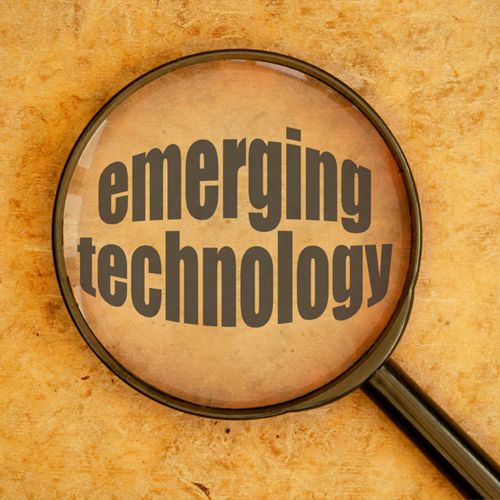
EMERGING HEALTH IT & SERVICES COMPANIES
Quick resources.

TESTIMONIALS

Black Book is the only unbiased rating system. Honestly vendor agnostic. They independently survey all user groups, not just CIO's staff and they don't engage vendors until results are in.

Connect with us

DOWNLOAD THE APP

- BLACK BOOK RESEARCH, LLC.
- 727-222-5656
- [email protected]
2024 Black Book Research / All Rights Reserved / Terms of use
2021 Black Book Research / All Rights Reserved / Terms of use
- Enroll & Pay
- Prospective Students
- Current Students
- Degree Programs
The Black Book Project: What kinds of important research questions are we asking?

Based on our collection of some 2000 novels, most of which are neither widely read nor taught, we see the digital medium as a way to provide new levels of access, consolidate a large amount of data and invite new questions. What patterns exist among book titles, word count and chapter structure of the novels? What are the terms and examples do authors use to describe race and racial tension, and how does this shift over time? Which African American authors are inclined to use unique words and phrases? How many and which prominent historical figures make appearances in the novels? How much do the novelists represent variations of standard and African American vernacular English in their works? What physical environments and distinct regions are described in the novels, and what common words and phrases are used to describe those places? How do stylistic preferences differ from writer to writer? How do these questions alter current organizing premises/theories about black novels?
Black Literature and DigitalHumanities: The Black Book Interactive Project
Tags: Black book , Digital Humanities

- People Directory
- Safety at UD

- Campus & Community
- Nation & World
- Culture & Society

The history of black books
Article by Allison Ebner and Ann Manser Photos by Kathy F. Atkinson and Evan Krape June 17, 2019
Scholars explore the designing, printing and publishing of black books
The old adage is true: You can’t judge a book by its cover. But if you want to know the real story behind the book, you need to look beyond the content too.
“In terms of really understanding the meaning of a book, you need to get into the history of how it was printed, made and put together,” said Curtis Small Jr., senior assistant librarian in the Special Collections Department at the University of Delaware Library, Museums and Press.
That’s the crux of bibliography, a field that examines the various aspects that go into the making of a book or printed object — especially the material aspects, like paper, watermarks, bindings, illustrations, typography and typesetting — and how they change with time and technology.
African American literature has long been understudied and under-recorded in the field of bibliography. “Black people had a hard time getting published and a harder time staying in print, so it was a challenge to find the information to study the history of that literature,” Small said.
To delve deeper into the history of African American print production and reading, UD hosted, “Black Bibliographia: Print/Culture/Art,” a symposium that encouraged scholars to come together to explore the question, “What is a black book?”
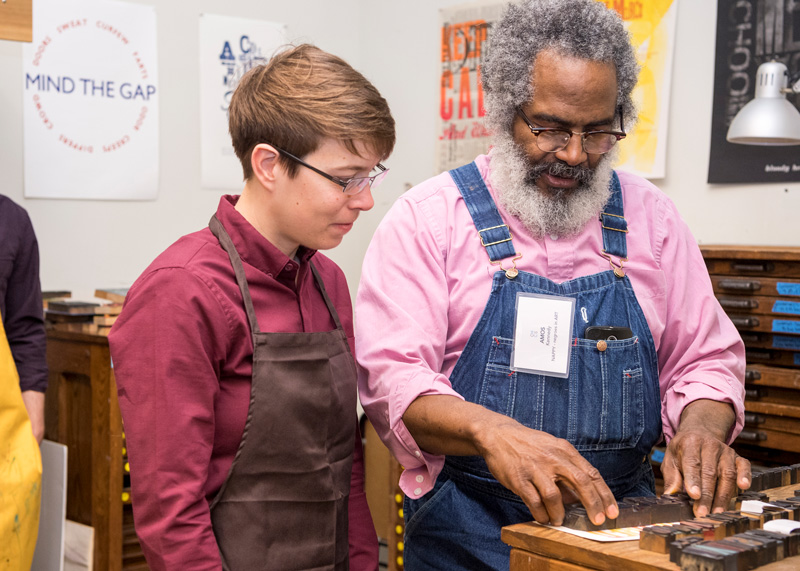
The symposium, which took place April 26-27 in Morris Library and Memorial Hall, brought together nearly 100 scholars from cultural institutions across the country who specialize in book history, visual studies and material culture. Small organized the symposium with Laura Helton, assistant professor of English, and Jesse Erickson, coordinator of Special Collections and Digital Humanities, assistant professor of English, and associate director of the Interdisciplinary Humanities Research Center.
Curators, librarians, archivists, art historians, digital humanists, book artists and others contributed to the conversations in meaningful ways.
Tia Blassingame — book artist, director of Scripps College Press and owner of Primrose Press — was one speaker. Book artists, like Blassingame, know the history of bookmaking techniques and can use older techniques to make a statement or to prompt the audience to think. In this way, artists’ books stand as a testament to and reflection of material culture.
Through the use of handmade paper, printmaking techniques, book binding, letterpress printing and period typefaces, Blassingame creates pieces of art that allow viewers to think of, and discuss, issues of race. They allow viewers to reflect on disturbing history in different ways.
“Part of what we wanted to do was to bring people together who don’t usually get together to have these conversations,” Small said. “If you’re working on the history of illustration, what a book artist is doing won’t necessarily inform your research, but it’s still part of the whole. It will inform the whole picture.”
The discussions that ensued were part of a “historic” gathering, according to the symposium’s keynote speaker Meredith L. McGill, associate professor of English at Rutgers University. “Many of us felt as if much-desired conversations were happening for the first time in our lives,” McGill said. “All kinds of joy rebounded from those walls.”
Much of that joy stemmed from the research, projects and opportunities presented.
Take, for instance, the discussion of African American printer and illustrator Patrick Henry Reason by Phillip Troutman of George Washington University. During his presentation, Troutman said that Reason used a specific type of engraving — stipple engraving, which uses dots of various sizes and densities — to render black skin tones. At the time, most other illustrations that were engravings weren’t using the technique to achieve that effect.
“In bibliography, we’re interested in the different ways books can be illustrated and what you can learn from the different illustration techniques used in a book,” Small said. “In this case, we learned how someone had used technology to represent African Americans physically. We had never heard this research before.”
During Friday’s keynote, McGill and Jacqueline Goldsby, professor of English and African American Studies at Yale University, discussed the Black Bibliography Project, a Mellon Foundation-funded digital project that will not only help fill in information gaps about African American literature, but create a bibliography model specific to it. This web-based tool will allow scholars to collaboratively document African American literary histories while addressing the specific challenges and nuances of African American publishing, like oral versions of texts, that don’t fit within traditional bibliographies.
“[This project] is going to be cutting-edge in terms of linked data to allow for more robust kinds of searches,” Small said. “It’s the kind of stuff that will take many years to develop, but the symposium attendees were just beside themselves [with excitement].”
Opportunities
The history of print culture looks at the material aspects and different technologies that changed throughout time. A pre-conference workshop offered attendees a chance to get hands-on experience with the technique of letterpress printing at Raven Press, operated by the Department of Art and Design in UD’s Studio Arts Building.
Amos Paul Kennedy Jr., a commercial printer based in Detroit and widely known for his bold and artistic hand-pressed posters, led the workshop. He demonstrated letterpress typesetting, showing participants how to apply colored inks to individual letters using a small roller, position paper in the press and turn the hand crank to roll the paper over the letters. Attendees were able to don aprons and try out the inking and printing process themselves to learn more about the technique once frequently used in African American printing.
The Center for Material Culture Studies and the Library, Museums and Press sponsored the symposium, which served as the CMCS Biennial Conference in Material Culture. The College of Arts and Sciences, the Paul R. Jones Initiative and the Department of English were also involved.
The topic for this year’s symposium was selected by a team that sought new ways of covering African American voices, said Martin Brueckner, professor of English and co-director of UD’s Center for Material Culture Studies (CMCS). He said panelists were invited from a wide range of backgrounds, encompassing academics and practitioners, and reflecting “the broad definition of material culture we have at the University of Delaware.”
Attendees actively tweeted their reactions and takeaways throughout the symposium. For a deeper look at the research, projects and opportunities discussed during the event, read through the #BlackBib thread on Twitter.
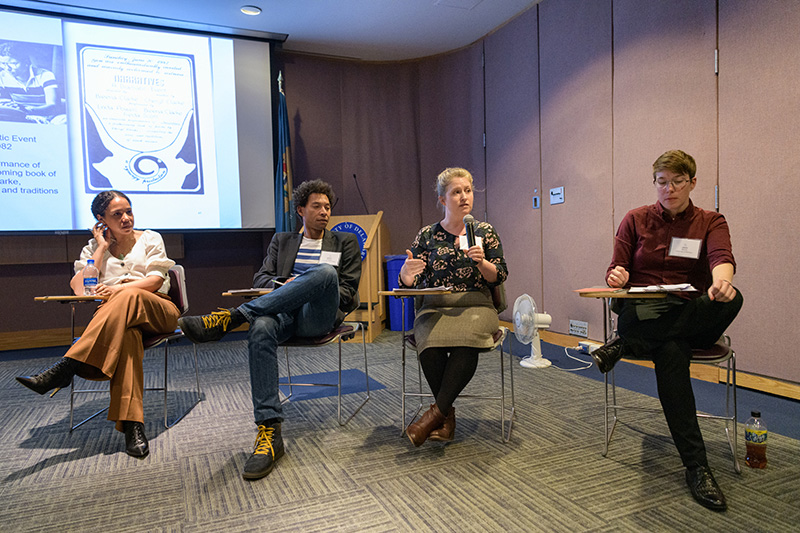
More Culture & Society Stories
Poetry as activism festival.
May 06, 2024
Article by UD Library, Museums and Press Staff
Dynamic pricing is on the rise
April 18, 2024
Article by Andrew Sharp
Advancing the arts
April 08, 2024
Article by Megan M.F. Everhart
See More Stories
Subscribe to UDaily >
Have a udaily story idea.
Contact us at [email protected]
Members of the press
Contact us at 302-831-NEWS or visit the Media Relations website
ADVERTISEMENT
- Campus & Community
- Nation & World
- Culture & Society
- UD Magazine
- In Memoriam
- Media Experts
Office of Communications & Marketing 105 E. Main St. Newark, DE 19716 [email protected] Phone: 302-831-2792
How to Tell 400 Years of Black History in One Book
From 1619 to 2019, this collection of essays, edited by two of the nation’s preeminent scholars, shows the depth and breadth of African American history
History Correspondent
/https://tf-cmsv2-smithsonianmag-media.s3.amazonaws.com/filer/31/de/31deb99d-0dcc-43eb-b801-171fb1aec4bc/gettyimages-515185532.jpg)
In August of 1619, the English warship White Lion sailed into Hampton Roads, Virginia, where the conjunction of the James, Elizabeth and York rivers meet the Atlantic Ocean. The White Lion ’s captain and crew were privateers, and they had taken captives from a Dutch slave ship. They exchanged, for supplies, more than 20 African people with the leadership and settlers at the Jamestown colony. In 2019 this event, while not the first arrival of Africans or the first incidence of slavery in North America , was widely recognized as inaugurating race-based slavery in the British colonies that would become the United States.
That 400th anniversary is the occasion for a unique collaboration: Four Hundred Souls: A Community History of African America, 1619-2019 , edited by historians Ibram X. Kendi and Keisha N. Blain. Kendi and Blain brought together 90 black writers—historians, scholars of other fields, journalists, activists and poets—to cover the full sweep and extraordinary diversity of those 400 years of black history. Although its scope is encyclopedic, the book is anything but a dry, dispassionate march through history. It’s elegantly structured in ten 40-year sections composed of eight essays (each covering one theme in a five-year period) and a poem punctuating the section conclusion; Kendi calls Four Hundred Souls “a chorus.”
The book opens with an essay by Nikole Hannah-Jones, the journalist behind the New York Times ’ 1619 Project , on the years 1619-1624, and closes with an entry from Black Lives Matter co-creator Alicia Garza writing about 2014-19, when the movement rose to the forefront of American politics. The depth and breadth of the material astounds, between fresh voices, such as historisn Mary Hicks writing about the Middle Passage for 1694-1699, and internationally renowned scholars, such as Annette Gordon-Reed writing about Sally Hemings for 1789-94. Prominent journalists include, in addition to Hannah-Jones, The Atlantic ’s Adam Serwer on Frederick Douglass (1859-64) and New York Times columnist Jamelle Bouie on the Civil War (1864-69). The powerful poems resonate sharply with the essays, Chet’la Sebree’s verses in “And the Record Repeats” about the experiences of young black women, for example, and Salamishah M. Tillet’s account of Anita Hill’s testimony in the Senate confirmation hearings for Supreme Court Justice Clarence Thomas.
“We are,” Kendi writes in the introduction collectively of black Americans, “reconstructing ourselves in this book.” The book itself, Blain writes in the conclusion, is “a testament to how much we have overcome, and how we have managed to do it together, despite our differences and diverse perspectives.” In an interview, Blain talked about how the project and the book’s distinctive structure developed, and how the editors imagine it will fit into the canon of black history and thought. A condensed and edited version of her conversation with Smithsonian is below.
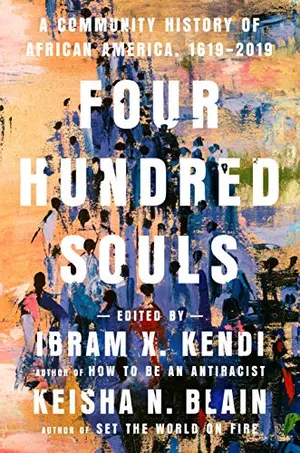
Four Hundred Souls: A Community History of African America, 1619-2019
Four Hundred Souls is a unique one-volume “community” history of African Americans. The editors, Ibram X. Kendi and Keisha N. Blain, have assembled 90 brilliant writers, each of whom takes on a five-year period of that four-hundred-year span.
How did the Four Hundred Souls book come about?
We started working on the project in 2018 (it actually predates the [publication of] the New York Times 1619 Project.) Ibram reached out to me with the idea that with the 400th year anniversary of the first captive Africans arriving in Jamestown, maybe we should collaborate on a project that would commemorate this particular moment in history, and look at 400 years of African American history by pulling together a diverse set of voices.
The idea was that we'd be able to create something very different than any other book on black history. And as historians, we were thinking, what would historians of the future want? Who are the voices they would want to hear from? We wanted to create something that would actually function as a primary source in another, who knows, 40 years or so—that captures the voices of black writers and thinkers from a wide array of fields, reflecting on both the past but also the present too.
Did you have any models for how you pulled all these voices together?
There are a couple of models in the sense of the most significant, pioneering books in African American history. We thought immediately of W.E.B. De Bois' Black Reconstruction in America in terms of the scope of the work, the depth of the content, and the richness of the ideas. Robin D.G. Kelley's Freedom Dreams is another model, but more recent. Martha Jones' Vanguard , is a book that captures decades right of black women's political activism and the struggle for the vote in a way that I think, does a similar kind of broad, sweeping history. Daina Ramey Berry and Kali N. Gross's Black Woman's History of the United States is another.
But ours was not a single authored book or even an edited collection of just historians. We didn't want to produce a textbook, or an encyclopedia. We wanted this work to be, as an edited volume, rich enough and big enough to cover 400 years of history in a way that would keep the reader engaged from start to finish, 1619 to 2019. That’s part of the importance of the multiple different genres and different voices we included moving from period to period.
How does Four Hundred Souls reflect the concept of a community history?
We figured that community would show up in different ways in the narrative, but we were really thinking initially, how do we recreate community in putting this book together? One of the earliest analogies that Ibram used was describing this as a choir. I love this—he described the poets as soloists. And then in this choir, you'd have sopranos, you'd have tenors, and you’d have altos. And so the question was: Who do we invite to be in this volume that would capture collectively that spirit of community?
We recognized that we could never fully represent every single field and every single background, but we tried as much as possible. And so even in putting together the book, there was a moment where we said, for example, "Wait a minute, we don't really have a scholar here who would be able to truly grapple with the sort of interconnection between African American History and Native American history." So we thought, is there a scholar, who identifies as African American and Native American and then we reached out to [UCLA historian] Kyle Mays .
So there were moments where we just had to be intentional about making sure that we were having voices that represented as much as possible the diversity of black America. We invited Esther Armah to write about the black immigrant experience because what is black America without immigrants? The heart of black America is that it's not homogenous at all—it's diverse. And we tried to capture that.
We also wanted to make sure that a significant number of the writers were women, largely because we acknowledge that so many of the histories that we teach, that we read, and that so many people cite are written by men. There's still a general tendency to look for male expertise, to acknowledge men as experts, especially in the field of history. Women are often sidelined in these conversations . So we were intentional about that, too, and including someone like Alicia Garza, one of the founders of Black Lives Matter, we wanted to acknowledge the crucial role that black women are playing in shaping American politics to this very day.
How did historians approach their subjects differently than say, creative writers?
One of the challenges with the book, which turned out to be also an opportunity, was that we were focusing on key historical moments, figures, themes and places in the United States, each within in a very specific five-year period. We actually spent a lot of time mapping out instructions for authors. It wasn't just: “Write a piece for us on this topic.” We said, “Here's what we want and what we don't want. Here's what we expect of you ask these questions as you're writing the essay, make sure you're grappling with these particular themes.”
But they also had to have a bit of freedom, to look backward, and also to look forward. And I think the structure with a bit of freedom worked, it was a pretty nice balance. Some essays the five years just fit like a glove, others a little less so but the writers managed to pull it off.
We also spent a lot of time planning and carefully identifying who would write on certain topics. “Cotton,” which memoirist Kiese Laymon wrote about for 1804-1809, is a perfect example. We realized very early that if we asked a historian to write about cotton, they would be very frustrated with the five-year constraint. But when we asked Kiese, we let him know that we would provide him with books on cotton and slavery for him to take a look at. And then he brought to it his own personal experience, which turned out to be such a powerful narrative. He writes, “When the land is freed, so will be all the cotton and all the money made off the suffering that white folks made cotton bring to Black folks in Mississippi and the entire South.”
And so that's the other element of this too. Even a lot of people wondered how we would have a work of history with so many non-historians. We gave them clear guidance and materials, and they brought incredible talent to the project.
The New York Times ’ 1619 project shares a similar point of origin, the 400th anniversary of the arrival of enslaved Africans to colonial America. What did you make of it when it came out last year?
When the 1619 Project came out, [Ibram and I] were thrilled, because actually, it, in so many ways, complemented our vision for our project. Then we decided we really had to invite Nikole Hannah-Jones to contribute. We weren't sure who we would ask for that first essay, but then we were like, "You know what? This makes sense."
I know there are so many different critiques, but for me, what is most valuable about the project is the way that it demonstrates how much, from the very beginning, the ideas and experiences of black people have been sidelined.
This is why we wanted her to write her essay [about the slave ship White Lion .] Even as someone who studied U.S. history, I did not even know about the White Lion for many years. I mean, that's how sad it is…but I could talk about the Mayflower . That was part of the history that I was taught. And so what does that tell us?
We don't talk about 1619 the way that we do 1620. And why is that? Well, let's get to the heart of the matter. Race matters and racism, too, in the way that we even tell our histories. And so we wanted to send that message. And like I said, to have a complementary spirit and vision as the 1619 Project.
When readers have finished going through 400 Souls , where else can they read black scholars writing on black history?
One of the things that the African American Intellectual History Society [Blain is currently president of the organization] is committed to doing is elevating the scholarship and writing of Black scholars as well as a diverse group of scholars who work in the field of Black history, and specifically Black intellectual history.
Black Perspectives [an AAIHS publication] has a broad readership, certainly, we're reaching academics in the fields of history and many other fields. At the same time, a significant percentage of our readers are non-academics. We have activists who read the blog, well known intellectuals and thinkers, and just everyday lay people who are interested in history, who want to learn more about black history and find the content accessible.
Get the latest History stories in your inbox?
Click to visit our Privacy Statement .
A Note to our Readers Smithsonian magazine participates in affiliate link advertising programs. If you purchase an item through these links, we receive a commission.
Karin Wulf | | READ MORE
Karin Wulf is the director of the John Carter Brown Library and a historian at Brown University. She was previously the executive director of the Omohundro Institute of American History & Culture and a professor of history at William & Mary.
African American Literature Research Paper Topics

This article provides a comprehensive guide to African American literature research paper topics , highlighting the depth and richness of this vibrant literary tradition. From historical narratives of slavery and the Harlem Renaissance to modern themes and the future of Black literature, the piece offers a structured approach for students seeking research directions. In addition to topic suggestions, it offers insights into selecting the perfect topic, crafting a compelling research paper, and the invaluable services provided by iResearchNet. Whether a novice or an expert, this article serves as a definitive resource for delving into the heart of African American literary discourse.
100 African American Literature Research Paper Topics
African American literature, with its rich tapestry of experiences, histories, cultural shifts, and iconic personalities, provides fertile ground for research. As students and scholars navigate this field, the potential for discovering nuanced arguments and insights is boundless. Here is a comprehensive list divided into ten categories, each boasting ten intriguing African American literature research paper topics that could shape your next research paper:
Academic Writing, Editing, Proofreading, And Problem Solving Services
Get 10% off with 24start discount code.
1. Historical Contexts:
- The Evolution of African American Literature from the 18th to the 21st Century.
- Literature of the Slavery Era: Voices of the Enslaved.
- The Harlem Renaissance: A Golden Age of Black Artistry.
- African American Literature during the Civil Rights Movement.
- Black Arts Movement: Literature as a Form of Protest.
- Depictions of Jim Crow Laws in African American Fiction.
- The Great Migration and its Influence on Black Writers.
- The Impact of the Reconstruction Era on African American Narratives.
- Literature of the Black Power Movement.
- WWII and the Portrayal of African American Soldiers in Literature.
2. Iconic Writers and their Works:
- The Universal Themes in Langston Hughes’ Poetry.
- Zora Neale Hurston’s Ethnographic Approach in “Their Eyes Were Watching God”.
- The Dual Consciousness in W.E.B. Du Bois’ Literary Works.
- Maya Angelou: Literature as a Tool for Healing and Empowerment.
- The Metaphorical Landscape of Toni Morrison’s “Beloved”.
- Ralph Ellison’s “Invisible Man”: An Exploration of Identity and Culture.
- James Baldwin’s Commentary on Race and Sexuality.
- Richard Wright’s Realistic Portrayal of Black Life.
- The Influence of African Culture in the Works of Chinua Achebe.
- August Wilson’s Ten-Play Series: A Chronicle of the Black Experience in America.
3. Genres and Styles:
- African American Science Fiction and Speculative Fiction.
- Jazz and Blues Influences in African American Poetry.
- The Rise of African American Autobiographical Literature.
- Black Drama and Theater: From the Page to the Stage.
- African American Romance Novels: Love in a Complex Social Setting.
- The Importance of Folktales and Myths in African American Short Stories.
- The Evolution of the African American Novel.
- Black Detective Fiction: Exploring Crime in the Inner City.
- The Role of Spirituality in African American Literary Fiction.
- African American Children’s Literature: Shaping Young Minds.
4. Themes and Motifs:
- The Quest for Identity in African American Literature.
- Love, Pain, and Resilience: Common Themes in Black Literature.
- The Role of Religion and Spirituality in African American Narratives.
- The Motif of the Tragic Mulatto in African American Literature.
- The Role of Nature in African American Poetry.
- The Intersection of Race and Gender in Black Women’s Literature.
- The Concept of ‘Home’ and ‘Exile’ in African American Literature.
- Literature’s Depiction of Black Masculinity and Femininity.
- Economic Inequality in African American Fiction.
- The African American Family Dynamic in Literature.
5. Modern and Contemporary Works:
- Hip Hop Culture and its Influence on Modern Black Literature.
- Contemporary African American Literature in the Digital Age.
- The Role of Literature in the Black Lives Matter Movement.
- LGBTQ+ Representation in Modern African American Literature.
- The Influence of African American Literature on Modern Pop Culture.
- Black Literature in the Post-Obama Era.
- African American Literature’s Response to Police Brutality.
- The Influence of Social Media on African American Poetry.
- African American Literature in the Age of Globalization.
- The Future Trajectories of African American Literature.
6. Comparative Literature:
- African vs. African American Literature: Themes and Differences.
- African American Literature in relation to Latin American Literary Movements.
- The Shared Themes of Oppression in Black and Indigenous Literatures.
- Comparative Analysis of Black Literature from Different Continents.
- African American and Asian American Literature: Intersections of Race and Identity.
- Parallels between African American Literature and South African Apartheid Literature.
- The Influence of British Literature on African American Writers.
- Themes of Resistance: African American and Palestinian Literatures.
- African American Literature and the Caribbean Literary Tradition.
- Shared Struggles: African American and Irish Literature.
7. Adaptations and Influence:
- The Impact of African American Literature on Hollywood.
- Stage Adaptations of Iconic African American Literary Works.
- The Influence of Black Literature on Music, especially Hip Hop and R&B.
- How African American Literature Shaped Modern Fashion Trends.
- African American Literature’s Influence on Visual Arts.
- The Role of African American Literature in Academic Curricula.
- The Adaptation of African American Novels into Graphic Novels and Comics.
- Television Series Inspired by African American Literary Classics.
- The Global Impact of African American Literature.
- African American Literature in Multimedia: From Video Games to Virtual Reality.
8. Critical Theories and African American Literature:
- Postcolonial Readings of African American Texts.
- Feminist Approaches to Black Women’s Literature.
- Queer Theory and African American Literary Criticism.
- Marxist Interpretations of African American Literature.
- Applying Psychoanalytic Theory to Black Literary Works.
- Deconstructing Race: Structuralism and African American Texts.
- African American Literature through the Lens of Critical Race Theory.
- The Eco-critical Reading of African American Nature Poetry.
- Posthumanism and African American Science Fiction.
- African American Literature and the Postmodernist Approach.
9. Literature and Activism:
- Literature as a Tool for Social Change in the Civil Rights Era.
- The Black Arts Movement: Artistry and Activism Hand in Hand.
- Writers as Activists: The Dual Roles of Iconic African American Authors.
- The Role of Journals and Magazines in Promoting Black Literary Activism.
- African American Literature and Environmental Activism.
- Black Literature’s Response to the Prison Industrial Complex.
- African American Literature’s Role in Feminist Movements.
- Literature’s Response to Racial Health Disparities.
- African American Literature and Economic Justice Activism.
- The Influence of Black Literary Societies in Advocating for Equality.
10. Pedagogical Approaches:
- Teaching African American Literature in High School: Benefits and Challenges.
- Incorporating Black Literature into a Diverse College Curriculum.
- The Role of African American Literature in Promoting Critical Thinking.
- Strategies for Making African American Texts Relatable to Non-Black Students.
- The Importance of Context when Teaching Historical African American Texts.
- Interactive Methods for Teaching African American Poetry.
- Utilizing Multimedia Tools in Teaching Contemporary Black Literature.
- Addressing Controversial Topics in African American Literature in the Classroom.
- The Role of African American Literature in Promoting Empathy and Cultural Awareness.
- Evaluative Techniques for Assessing Understanding of African American Literary Themes.
This list, while comprehensive, is but a starting point. The expansive nature of African American literature ensures that scholars and students alike can find a topic that resonates deeply with their interests and academic pursuits. Whether you’re delving into historical narratives, analyzing literary techniques, or examining the socio-cultural impacts of certain works, African American literature offers a profound journey of discovery.
African American Literature
And the range of research paper topics it offers.
African American literature, rooted deeply in the history and experiences of a people who faced extreme adversity, has evolved into a potent voice of resilience, creativity, and resistance. This vast literary field mirrors the collective struggle for identity, civil rights, and cultural acknowledgment, echoing centuries of pain, hopes, dreams, and triumphs.
The genesis of African American literature lies in the evocative spirituals, work songs, and oral traditions passed through generations. These were more than just rhythmic tunes or recounted tales; they were resonant chronicles of anguish, desire for freedom, and an indomitable spirit. The oral traditions of storytelling, tracing back to African roots, relayed stories of ancestors, imparted wisdom, and offered hope in times of despair. With the transition from the African continent to the Americas due to the brutalities of the transatlantic slave trade, these stories underwent a metamorphosis, reflecting the new harrowing realities of life in chains.
As the nation approached and then moved past the Emancipation Proclamation, written narratives began to emerge. Autobiographies and firsthand accounts of life under the yoke of slavery became a literary weapon. Works such as Frederick Douglass’s “Narrative of the Life of Frederick Douglass, an American Slave” and Harriet Jacobs’ “Incidents in the Life of a Slave Girl” provided chilling glimpses into the inhumanity of slavery. These narratives, while highlighting the horrors, also emphasized the resilience and determination of those who resisted and survived.
The dawn of the 20th century saw the emergence of the Harlem Renaissance, a glorious epoch where African American culture, especially literature, blossomed in full splendor. This was not merely a literary movement; it was a cultural reawakening. Writers like Langston Hughes, Zora Neale Hurston, and Claude McKay began exploring themes of racial pride, urbanization, and the nuances of the Black experience in America. Their writings, be it poetry, novels, or essays, encapsulated a newfound cultural confidence and an unapologetic embrace of Black heritage.
The subsequent decades, especially the tumultuous 1960s and the Civil Rights era, bore witness to literature that was heavily activist in tone. Authors like James Baldwin, with his incisive commentary on race and sexuality, and Toni Morrison, with her profound explorations of Black identity and trauma, set the literary world alight. Maya Angelou’s autobiographical works celebrated Black womanhood’s multifaceted nature, while Ralph Ellison’s “Invisible Man” laid bare the intricacies of racial invisibility and identity.
Contemporary African American literature continues to evolve, breaking new ground and venturing into previously uncharted territories. Octavia Butler’s foray into science fiction challenges racial and gender norms, while Colson Whitehead’s speculative narratives provide alternative historical perspectives with profound insights.
Given this vast and layered literary canvas, the spectrum of African American literature research paper topics is boundless. Scholars and students can journey through historical epochs, understanding the societal shifts and their implications on literary themes. They can dissect the works of iconic figures, charting their evolution and impact. Themes like migration, urbanization, love, trauma, and racial identity recur across eras, offering opportunities for comparative studies. Moreover, the adaptability of African American literature in various media forms, from the silver screen to haunting melodies, presents a multidisciplinary approach for research.
In essence, African American literature stands as a monumental testament to a people’s journey from chains to freedom, from invisibility to acknowledgment. It offers a plethora of avenues for academic exploration, ensuring that every research endeavor within its realm is a deep dive into cultural, historical, and literary richness.
How to Choose African American Literature Research Paper Topics
Choosing the right research topic is akin to embarking on a literary journey. When you’re venturing into the vast realm of African American literature, the sheer depth and diversity of potential subjects can be both inspiring and overwhelming. How do you zero in on a topic that not only captivates your interest but also offers scope for extensive research and fresh insights? Here’s a step-by-step guide to help you navigate this important decision-making process.
- Understand the Purpose: Before anything else, clarify the objective of your research paper. Is it to critically analyze a specific work or author? Perhaps you’re aiming to explore broader themes or trends across decades or genres. Having a clear understanding of your research goal will significantly narrow down your topic options.
- Dive into Preliminary Reading: Engage with primary texts, anthologies, and critical essays to familiarize yourself with the landscape of African American literature. This initial exploration will introduce you to recurring themes, influential authors, historical contexts, and evolving narratives.
- Identify Your Passion: What moves you? Is it the raw emotion in Maya Angelou’s poetry, the speculative realms created by Octavia Butler, or the historical intricacies in the works of Colson Whitehead? A topic that you’re genuinely passionate about will make the research process more engaging and rewarding.
- Consult Secondary Sources: Academic journals, critiques, and theses offer critical discussions on various African American literature research paper topics. These can inspire new perspectives or help refine your chosen subject.
- Check for Feasibility: A topic might be intriguing, but it’s essential to ensure there’s enough information available for in-depth research. Check libraries, online databases, and literary journals to see if your chosen topic has substantial resources and references.
- Seek Diversity: African American literature is enriched by a multiplicity of voices – from urban tales to rural narratives, from historical accounts to futuristic visions. Consider exploring lesser-known authors or texts to bring fresh perspectives to your research.
- Consider Interdisciplinary Approaches: African American literature often intersects with fields like history, sociology, music, and politics. An interdisciplinary approach can yield richer insights and set your paper apart.
- Engage in Discussions: Conversations with peers, professors, or literary enthusiasts can spark new ideas or refine existing ones. They might introduce angles you hadn’t considered or highlight potential pitfalls in your chosen topic.
- Stay Updated: The world of African American literature is dynamic. New critiques, interpretations, and discussions emerge regularly. Stay updated with the latest literary journals and forums to ensure your research is contemporary and relevant.
- Revisit and Refine: Once you’ve chosen a topic, revisit it after a period of contemplation. Refining and narrowing it down further can lead to a more focused and impactful research paper.
The rich tapestry of literature offers a myriad of African American literature research paper topics for exploration. While the abundance of choices can be daunting, a systematic approach to topic selection can ensure that your research is not only academically rigorous but also personally fulfilling. Always remember that the journey of delving deep into literature, understanding nuances, and unearthing new perspectives is as rewarding as the final paper itself. Let your passion for the subject guide you, and you’re sure to embark on a memorable academic adventure.
How to Write an African American Literature Research Paper
Embarking on a research paper about African American literature is not just an academic endeavor, but a deep dive into a world of struggle, triumph, resilience, and unparalleled creative expression. This vast realm of literature is imbued with historical significance and offers profound insights into the Black experience in America. As you begin your scholarly journey, here are ten pivotal tips to guide you in crafting a compelling and insightful research paper.
- Lay a Strong Foundation: Start with an illuminating introduction. A powerful opening, whether it’s a relevant quote from a notable African American author or a provocative question related to your topic, will engage your readers instantly. Following this, provide a brief backdrop of the historical or societal context relevant to your subject before zeroing in on your thesis statement.
- Prioritize Organization: An organized structure is pivotal. Depending on the breadth of your topic, categorize your paper either chronologically, thematically, or based on specific authors and works. Incorporate clear subheadings to enhance readability.
- Root Your Claims in Evidence: Every assertion or claim you make should be substantiated with concrete evidence, whether from primary texts, scholarly articles, or critical essays. Ensure all quotations and references are appropriately cited.
- Embrace Multiple Angles: Present a comprehensive view of your topic by integrating various literary criticisms or perspectives. This showcases not only the depth of your research but also your holistic understanding of the subject.
- Maintain Cohesiveness: Seamless transitions between sections and ideas are crucial. This ensures your paper reads fluidly, guiding your reader effortlessly from one point to the next.
- Engage in Deep Analysis: Surface readings won’t suffice. Dive deep into the layers of the text, examining elements like symbolism, historical context, or character development. Understand the sociopolitical influences on the works you’re studying, be it the Harlem Renaissance, Civil Rights Movement, or other significant epochs.
- Conclude with Purpose: Your conclusion should not merely be a recap. While revisiting your main arguments is essential, also aim to provide a broader perspective, hinting at the broader implications of your research or suggesting potential avenues for further exploration.
- Attention to Detail: Once your draft is complete, scrutinize it for clarity, logical flow, and coherence. Ensure that there are no grammatical or syntactical errors marring your work.
- Consistent Citation: Depending on the prescribed format – APA, MLA, Chicago/Turabian, or Harvard – ensure that every source, be it primary or secondary, is consistently and correctly cited. This lends credibility to your paper.
- Seek Feedback: Before final submission, consider having your paper reviewed by peers, mentors, or educators. Fresh eyes can offer invaluable insights, catching oversights you might have missed.
In conclusion, delving into African American literature for research is both an honor and responsibility. The richness of this literary tradition offers a unique lens into the Black experience, a testament to centuries of resilience, creativity, and cultural evolution. As you put pen to paper, remember that you’re not just crafting an academic document but contributing to a dialogue that spans generations. With passion, diligence, and adherence to these guidelines, your research paper will undoubtedly stand as a commendable addition to this ongoing conversation.

iResearchNet Writing Services
For custom african american literature research paper.
Delving into the intricate tapestry of African American literature can be a challenging yet immensely rewarding task. While the endeavor demands patience, precision, and a profound understanding of literary nuances, not every student has the resources or expertise to craft an impeccable research paper. This is where iResearchNet comes into play, bridging the gap between ambition and excellence. Let’s explore the multifaceted offerings of iResearchNet that can elevate your African American literature research paper to unparalleled heights.
- Expert Degree-Holding Writers: iResearchNet boasts a team of professional writers who hold advanced degrees in literature, with a specialization in African American literature. These experts bring to the table their vast knowledge, experience, and passion, ensuring your research paper is in the hands of those who understand the subject’s depth and breadth.
- Custom Written Works: Every paper penned by iResearchNet is crafted from scratch. Our writers ensure that your research paper is tailored to your specific needs, unique in content, and free from plagiarism.
- In-Depth Research: A quality research paper is rooted in extensive research. Our writers plunge deep into scholarly resources, ensuring the paper encapsulates a variety of perspectives, critical commentaries, and a comprehensive understanding of the topic.
- Custom Formatting: Be it APA, MLA, Chicago/Turabian, or Harvard, our team is adept at all major formatting styles. This guarantees your paper not only reads impeccably but also looks professional and adheres to your institution’s guidelines.
- Top Quality: iResearchNet prides itself on delivering premium quality work. Every paper undergoes rigorous quality checks, ensuring it meets the highest academic standards.
- Customized Solutions: Recognizing that every student’s needs are unique, iResearchNet offers tailored solutions. Whether it’s a specific focus area within African American literature or a comparative analysis with another literary tradition, our writers mold the paper as per your directives.
- Flexible Pricing: We understand the financial constraints students often face. Hence, our pricing structures are designed to be student-friendly, ensuring quality doesn’t become a strain on your pocket.
- Short Deadlines up to 3 Hours: Last-minute assignment? Don’t fret. Our experts are trained to handle tight schedules, delivering top-notch papers even with deadlines as short as three hours.
- Timely Delivery: Punctuality is a cornerstone of our services. No matter the complexity or length of your research paper, rest assured it will be in your inbox by the promised deadline.
- 24/7 Support: Questions, clarifications, or last-minute changes? Our dedicated support team is available round the clock, ensuring seamless communication and prompt resolutions.
- Absolute Privacy: We uphold a strict confidentiality policy, guaranteeing that your personal information and the details of your assignment remain private at all times.
- Easy Order Tracking: With our user-friendly platform, track your order’s progress in real-time, ensuring transparency and peace of mind.
- Money-Back Guarantee: iResearchNet stands by the quality of its services. If, for any reason, your delivered paper doesn’t align with your initial requirements, our money-back guarantee ensures you’re not left at a disadvantage.
To wrap it up, African American literature, with its vastness and intricacies, demands more than just surface-level understanding. It requires deep reverence, a meticulous approach, and a genuine appreciation of its legacy. With iResearchNet by your side, you’re not just getting a paper; you’re gaining a partner in your academic journey. Let us shoulder the load, ensuring your research paper on African American literature is nothing short of exemplary.
Embark on a Literary Exploration of Black Voices with iResearchNet
African American literature stands as a testament to centuries of resilience, brilliance, and a ceaseless quest for justice. The voices that reverberate through these texts tell tales of struggles and triumphs, offering profound insights into the African American experience. But to decipher and delve deep into these narratives requires dedication, an eye for detail, and an understanding of the socio-historical context.
But what if you had a companion on this journey? A guide to help you navigate the complexities, understand the nuances, and truly appreciate the power of black voices in literature?
That’s where iResearchNet steps in.
With iResearchNet, you’re not just commissioning a paper. You’re investing in a partnership with literary aficionados, experts who’ve dedicated their lives to literature and are passionate about sharing their knowledge. Our team is your bridge to understanding African American literature, ensuring your research is not only academically sound but also deeply insightful.
Yet, there’s more. Our commitment goes beyond delivering a research paper. It’s about fostering a love for literature, kindling curiosity, and ensuring you emerge with a richer understanding and appreciation of African American narratives.
So, why wait? Dive deep into the captivating world of African American literature with a team that’s as passionate about the subject as you are. Embark on this enlightening journey, amplify the voices that need to be heard, and let iResearchNet be your beacon on this literary exploration.
Take the first step towards excellence. Connect with iResearchNet today and let the stories of African American literature unfold before you.
ORDER HIGH QUALITY CUSTOM PAPER

- Locations and Hours
- UCLA Library
- Research Guides
Black Studies: African American and Pan African Diaspora
- Citing and Writing
- Reference Sources
- About Journal Articles
- African American/African Studies Databases and Websites
- African American/African Magazines & Journals Online
- African/African American Newspapers Online
- General/Interdisciplinary Databases
- Primary Resources
Citation Style Guides — Online
Citation style guides — print, annotated bibliographies, writing a paper get started here..
Sometimes you need to narrow or broaden your topic.
- What is a Research Paper? This link leads you to the OWL at Purdue , an excellent website with information on all aspects of writing a paper.
- How to Read a Call Number Do you wonder how to read a call number to find a book on the shelf? Check this page out for tips on how to do it.
- How to Read a Citation Can't tell the difference between a citation to a book or an article ? Check this page out for tips on how citations work.
Avoiding Plagiarism
See the Citing Sources Research Guide Section on Avoiding Plagiarism for more information.
- UCLA Academic Integrity (UCLA Dean of Students)
UCLA has a campuswide license to Turnitin.com. Some professors ask their students to turn their papers in electronically and the text is submitted to Turnitin.com where it is compared with a vast database of other student papers, online articles, general Web pages, and other sources. Turnitin.com then produces a report for the instructor indicating whether the paper was plagiarized and if so, how much. To access this resource, log in to MyUCLA and click on the Turnitin.com link in the left-hand column under "MyUCLA Features." There will only be a link if your professor is using Turnitin.com.
- Quick Guide to Turnitin.com
When citing sources be sure to use the proper citation style for the course. Below are links to ONLINE summarized citation rules from some of the more popular style guides:
- APA Style and Grammar Guidelines from American Psychological Association
- APA (American Psychological Association) Via OWL at Purdue Use the examples on this page. You DO NOT need to click the green START button to use the website.
- AAA (American Anthropological Association)
- MLA Style: Using MLA Format A quick guide to MLA formats based on the 9th edition of the MLA Handbook.
- MLA (Modern Language Association) Via OWL at Purdue Use the examples on this page. You DO NOT need to click the green START button and use the website.
- Chicago Manual of Style-Quick Guide Via University of Chicago Press.
- Chicago Manual of Style via OWL at Purdue. Use the examples on this page. You DO NOT need to click the green START button to use the website.
- Turabian Quick Guide Based on the Chicago Manual of Style.
- Guide to Citing Maps and Atlases
- Citing Film, Video and Online Media (MLA Style) Guide from UCB Media Center. Consult latest edition of the MLA handbook for any changes to formatting.
For a general introduction to academic citation and intellectual property, see Citing Sources .
For more detail, consult the complete printed style manuals, available in many campus libraries:
Preparing an annotated bibliography is often the first step in writing a research paper. Sometimes it is a stand-alone assignment. Annotations usually include both description and some evaluative comment. See Purdue University's OWL (Online Writing Lab) page (linked below) for more help in preparing an annotated bibliography.
- Annotated Bibliographies — Definition and Format This page from the OWL at Purdue provides basic information on annotated bibliography structure, with links to other parts of the OWL website.
- << Previous: Primary Resources
- Last Updated: Apr 7, 2024 11:48 PM
- URL: https://guides.library.ucla.edu/panaf
The Black Scholar
Journal of Black Studies and Research
Search this website

Dr. William Strickland, Esteemed Scholar and Political Activist (1937-2024), by Herb Boyd

Now Available: 54.1, Amiri Baraka’s Blues People at 60: Still a Portal to the Future
Call for chapters: post-soul afro-latinidad: a critical reader.

“BDSM Is More Than That”: An Interview with Olivia Troy, by Anna Ziering

Now Available: 53.3-4, Edgeplay: Black Radical Pleasure II

Now Available: 53.2, The Shape of Things to Come: Africology and the Rise of Afrofuturist Studies

Now Available: 53.1

Now Available: 52.4, Black Archival Practice II

Now Available: 52.3, Black Religions in the Digital Age

Now Available: 52.2, Black Archival Practice I

Black British Film Pioneer Henry G. Martin: An Obituary, by Louis Chude-Sokei

Now Available: 52.1, Post-Soul Afro-Latinidades

Now Available: 51.4, Going Electric

Now Available: 51.3, Antidoting
- Next »


Black Lives Matter: Books and Articles
- Books and Articles
- Media Resources
Article Databases: Specific Searches
- New York Times: Black Lives Matter
- Opposing Viewpoints Database: Black Lives Matter
- Social Issues Researcher Database: Civil Rights
- Academic Search Complete: Black Lives Matter
Specific Journals
- Journal of African American Studies
- Journal of American Studies
- Journal of Black Studies
- Journal of Urban Health
- Race and Justice
- Race and Social Problems
- Race and Society
- Criminology
Article Databases
An online resource that includes articles from academic journals, newspapers, magazines; audio; videos; opinion essays; and primary sources on current controversial issues. A good source of topic ideas for papers and speeches.
- America: History and Life with Full Text This link opens in a new window Covers the history and culture of the United States and Canada, from prehistory to the present.
- Oxford African American Studies Center This link opens in a new window Reference works focusing on the lives and events that have shaped African American and African history and culture.
Pros and cons on today’s complex social issues. Includes critical current issues and enduring social issues with full-text articles, multimedia, primary sources, government documents and reference material from over 1,800 national and international sources.
Contains full-text articles on topics in multiple disciplines, useful as a starting point for most subjects.
- Sociological Collection This link opens in a new window Provides coverage of more than 371 full text journals, and including 554 indexed and abstracted journals.
Provides bibliographic and full text content in all disciplines of business, including marketing, management, MIS, POM, accounting, finance and economics. Additional full text, non-journal content includes financial data, books, monographs, major reference works, book digests, conference proceedings, case studies, investment research reports, industry reports, market research reports, SWOT analysis and more back as far as 1886. In addition, searchable cited references are provided for more than 1,300 journals.

#Black Lives Matter
Book Searches
- Books owned by Tri-C with the Subject "Black Lives Matter Movement"
- Books that are owned by OhioLINK libraries with the subject "Black Lives Matter Movement"
E-Books on Racism
Ask a Librarian
- Next: Media Resources >>
- Last Updated: Feb 6, 2024 11:44 AM
- URL: https://libguides.tri-c.edu/BLM
THE ANDOR BLOG: INSIGHTS ON VIRTUAL HEALTH INNOVATION
Andor health tops black book market research rankings for virtual care solutions, stay up to date, search the blog.
Andor Health
In a recent survey conducted by Black Book Market Research LLC, Andor Health emerged as the frontrunner in client satisfaction for virtual care solutions. The company, renowned for its utilization of open AI and healthcare-trained ChatGPT models, has been recognized as the leader in various aspects, setting a new standard in the healthcare technology landscape.
Black Book Research conducted an extensive annual market research survey, reaching out to almost 1,000 clinicians and leaders across more than 750 facilities. The survey encompassed 18 evaluation criteria, delving into crucial aspects of virtual care solutions. The comprehensive analysis positioned Andor Health at the pinnacle of client satisfaction for any virtual care solution.
Key Performance Indicators: Andor Health's success is reflected in the outstanding scores it achieved across key performance indicators:
- Strategic Alignment of Client Goals including VBC, RCM & Telehealth: 9.80
- Innovation & Optimization: 9.84
- Client relationships and cultural fit: 9.63
- Trust, Accountability, Transparency, Ethics: 9.65
- Customization: 9.86
- Integration and interfaces: 9.70
- Brand image and marketing communications: 9.76
- Account Management Support and customer care: 9.75
- Best of breed technology and process improvement: 9.78
- Overall Mean: 9.67
Leveraging open AI and healthcare-trained ChatGPT models, ThinkAndor® enables care teams and patients to connect seamlessly across the care continuum. This groundbreaking platform unifies virtual health, allowing the entire health system to deliver care at scale.
Key Features of ThinkAndor®:
Efficiency Through Integration: Allows care teams to deliver care efficiently by leveraging existing media devices with no additional apps or setup. Video/audio endpoints can be repurposed to enable virtual nursing, virtual sitting, and virtual remote consultations at scale.
Seamless Workflow Integration: Existing clinical workflows remain untouched, empowering clinicians to join virtual sessions directly from the EHR.
Andor Health's top-ranking in Black Book Market Research's survey is a testament to its dedication to delivering innovative solutions that enhance virtual care experiences. As the healthcare industry continues to evolve, Andor Health stands as a beacon of excellence, providing a glimpse into the future of healthcare technology. Explore the full report and discover how AI-powered virtual care experiences can elevate your healthcare practices.
- Skip to primary navigation
- Skip to main content
- Skip to primary sidebar
- Skip to footer
Study Mumbai
ICSE, CBSE study notes & home schooling, management notes, solved assignments
Black Book Project Topics (Ideas)
January 24, 2023 by studymumbai Leave a Comment
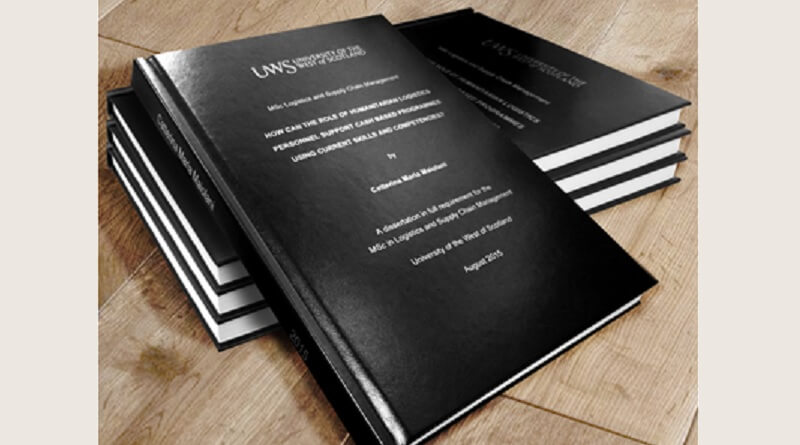
It is important to choose an appropriate topic for your final year black book project . It should be relevant and related to your electives, and should be of interest to you. Here are various Black Book Project topic ideas for your final year work.
Black Book Project Topic Ideas For Marketing
Here are Black Book Project Topic Ideas For Marketing:
GET INSTANT HELP FROM EXPERTS!
Hire us as project guide/assistant . Contact us for more information
- Study of test marketing and customer interaction
- A study of the MAREKETING STRATEGIES of MCDONALDS
- Market analysis and sales development of Amul milk
- Role of integrated marketing communication in Life Insurance
- Marketing survey and channel development
- Marketing Strategy of Cadbury Company
- Lux marketing
- Bisleri marketing project
- Customer relationship management and services marketing
- Impact of marketing activities on the sales of pharmaceutical companies
- Effectiveness of integrated marketing communication with respect to consumer attitude towards brand
- Attitude of people in different roles towards direct marketing
- Relationship between marketing research, customer knowledge and company sales
- Comparative study of sellers and buyers in market acceptability of licensed software
- Effects of product, market and organizational characteristics on market research practices
- Effects of search engine optimization on marketing performance of the companies
- Brand awareness and brand attitude as the predictors of market share
- Effect of mobile marketing on youngsters
- Study on strategies for promoting retailer’s brands
- Marketing strategy adopted for selling different mobiles
- Marketing strategy for multi-head computer embroidery machines
- Effective Brand Management
Black Book Project Topic Ideas For Advertising
Here are Black Book Project Topic Ideas For Advertising:
- Radio advertising
- Advertising in schools
- How Commercial Advertisements are made
- Portrayal of women in advertisements
- Role of children in advertising
- Alcohol and drugs in advertisements
- Smoking in advertisements
- History of advertising
- Innovative advertising campaigns
- Role of celebrities in advertisements
- Political advertising
- Advertising in the 21st century
- Internet advertising
- Popular Designer Ads
- Effect of advertisements on children
- Effect of recession advertising
- Application of advertising through cell phone framework among different types of goods and services
- Relationship between consumers internal usage practices and awareness to internal advertising
- Effect of deceptive advertising on consumer loyalty in any sector
- Effect of advertising research practices on organizational performance
- Relationship between corporate image and mobile phone advertising
- Revival of radio advertising in India
- Role of outdoor advertising in bringing awareness and developing perception for social causes
- Relationship between advertising, word of mouth and experiential perspective with respect to purchase intent
- Impact of advertising and price sensitivity and consumer buying behavior
- Influence of humour advertising on consumer brand perception
- Association between advertising messages’ content and response of the children
Black Book Project Topic Ideas For Consumer Behaviors
Here are Black Book Project Topic Ideas For Consumer Behaviors:
- Study on Consumer Behaviour in Automobile Industry
- Study on Consumer Behaviour related to different soap brands in Mumbai
- Consumer Behaviour towards public sector and private sector banks
- Study of Consumer Behaviour towards Life Insurance products in Mumbai
- Analysis of Consumer Behaviour in upgrading to conspicuous goods in branded apparels
- Consumer Behaviour towards Electronic Security solutions
- Study on changing consumer preference towards organized retailing and unorganized retailing
- Impact of promotional activities at mall on consumer’s behavior at shopping malls
- Study on factors influencing adaptability and usability of consumer electronics
- Future of consumer durables pertaining to Big Bazaar
- Influence of branding on consumer behavior
- Study on consumer electronics industry in India
- Consumer perception of M-commerce
- Study on consumer’s perception towards branded jewellery
- Importance of insurance to consumers
- Study on cross sales of sequentially ordered products in the consumer banking industry
- Feasibility study on consumer’s perception towards electronic moving messages – outdoor media advertising industry
- Consumer Behaviour in Buying Ball pens
- Study on consumer perception towards service quality of internet banking
- Consumer’s perception towards luxury car segment
- Impact of loyalty programs on consumer purchase behavior and loyalty
- Study on consumer perception of organized retailing in India
- Comparison between Samsung and other consumer durable brands
- Consumer satisfaction towards Nestle products
- Consumer’s buying behavior towards branded clothes in Delhi
Black Book Project Topic Ideas For Business Ethics
Here are Black Book Project Topic Ideas For Business Ethics:
- History and Teachings of Business Ethics
- Cross-cultural ethical issues of China and India
- Professional ethics of Indian managers and employees
- Corporate Wrongdoing – Corruption practices
- Role of top management in ethics
- Strategic planning of ethical culture in organizations
- Business deregulation policies and strategies
- International Business Strategies
- Benefits and disadvantages of public-private partnerships
- Functioning of business ethics in various departments of a business organization
- Human rights and labour practices
- Business of producing firearms ethical in the light of many civilian deaths
- Ethics of public-private partnerships
- Corporate social responsibility – way to cover exorbitant charges
- Are huge profits during recession justified?
- Targeted online advertising
- Collection of customer personal data by corporate
Black Book Project Topic Ideas For HR
Black Book Project Topic Ideas For HR:
- Employee Attitude towards the Organization
- Employee Motivation
- Recruitment and selection
Black Book Project Topic Ideas On Strategic Management
Black Book Project Topic Ideas On Strategic Management:
- Strategies used to build successful internet based customer services
- Report on BEST undertaking
- Six Sigma In Indian Industries
- Promotion strategies followed in insurance sector
- Organizational Study and marketing strategies of an organization
- Study of developing a communication strategy for an organization
- Study on strategies for optimizing the competency of middle level managers with reference to bank sector
- Analysis of the role of outdoor advertising and establishing strategies for managing space media
- ERP implementation strategies
- Supply Chain Management : International Market
Black Book Project Topic Ideas For Finance
Here are Black Book Project Topic Ideas For Banking, Insurance, Finance (BAF):
- Foreign Exchange and Risk Management
- Role of Financial Institutions in India
- Mutual Fund Schemes (Comparative Analysis)
- India Infoline: Derivatives
- Strategies on Derivative Trading
- Banking, Banking and Insurance, Retail banking, Investment Banking, Mobile Banking, Commercial Banking, Internet Banking, e-Banking, Retail Banking, Merchant Banking, Offshore Banking.
- Diversification Applications in Portfolio Management
- Product strategies of private life insurance companies
- Cybercrime in banking sector
- A Study on Financial Problems Faced by Start-Ups in India
- IPO in Indian market
StudyMumbai.com is an educational resource for students, parents, and teachers, with special focus on Mumbai. Our staff includes educators with several years of experience. Our mission is to simplify learning and to provide free education. Read more about us .
Related Posts:
- Engaging Class 11 (XI) English Project Topics and Ideas
- IKEA: Black book Project
- Various Investment Avenues In The Market (Black Book…
- Amazing school project ideas that are fun as well as…
- Sociology Project Topics and Materials
Reader Interactions
Leave a reply cancel reply.
You must be logged in to post a comment.
ICSE CLASS NOTES
- ICSE Class 10 . ICSE Class 9
- ICSE Class 8 . ICSE Class 7
- ICSE Class 6 . ICSE Class 5
- ICSE Class 4 . ICSE Class 2
- ICSE Class 2 . ICSE Class 1
ACADEMIC HELP
- Essay Writing
- Assignment Writing
- Dissertation Writing
- Thesis Writing
- Homework Help for Parents
- M.Com Project
- BMM Projects
- Engineering Writing
- Capstone Projects
- BBA Projects
- MBA Projects / Assignments
- Writing Services
- Book Review
- Ghost Writing
- Make Resume/CV
- Create Website
- Digital Marketing
STUDY GUIDES
Useful links.
- Referencing Guides
- Best Academic Websites
- FREE Public Domain Books

COMMENTS
They represent the opinions of healthcare professionals and clinicians from more than 4,600 hospitals, 600 IDNs, 2,800 clinics, 109,000 physician practices, 250 health plans, and nearly 500,000 healthcare industry consumers, and account for 8,000 products and services from more than 2,900 vendors. Black Book Research stops bots from stuffing ...
Here's the process that a student needs to follow as part of project completion: Select an appropriate topic (after discussing it with the professor). Make the project (and follow the structure provided) Submit the Project. Some colleges require students to submit a Project Synopsis, before submitting the main project.
JAAH, formerly The Journal of Negro History, founded by Dr. Carter G. Woodson in January 1916, is an official publication of ASALH. Now in its second century, the JAAH has long been the leading scholarly publication on African American life and history, and publishes original scholarly articles and book reviews on all aspects of the African ...
Journal of Black Studies (JBS), peer-reviewed and published bi-monthly, for the last half of a century has been the leading source for dynamic, innovative, and creative research on the Black experience.Poised to remain at the forefront of the recent explosive growth in quality scholarship in the field of Black studies, JBS offers important and intellectually provocative articles exploring key ...
70% Properties Have Sold Out | Book Now & Get Cashback Click Here. Find your ideal black book project topics with our comprehensive list of suggestions. Take the first step towards a successful black book project now.
The Black Book Project: What kinds of important research questions are we asking?
To delve deeper into the history of African American print production and reading, UD hosted, "Black Bibliographia: Print/Culture/Art," a symposium that encouraged scholars to come together to explore the question, "What is a black book?". Heidi Morse (left) watches workshop leader Amos Kennedy Jr. set letterpress type.
The enslavement of Blacks in the North American colonies has left a lasting system of racial oppression in the United States (Feagin, 2006).People of African descent (i.e., Black Americans) are subjugated to unfair treatment and social and economic oppression (Feagin, 2006).In the United States, Blacks were originally thought to be culturally deficient, and therefore any common practices among ...
Our secondary review focused on theoretical and conceptual papers, policy reports, task force reports, and commentary and opinion pieces that focused on the education of Black males in general. ... Gender identity more than racial identity is at the tension of book selection for Black boys, and research suggests designing a curriculum that ...
Four Hundred Souls: A Community History of African America, 1619-2019. Four Hundred Souls is a unique one-volume "community" history of African Americans. The editors, Ibram X. Kendi and ...
100 African American Literature Research Paper Topics. African American literature, with its rich tapestry of experiences, histories, cultural shifts, and iconic personalities, provides fertile ground for research. As students and scholars navigate this field, the potential for discovering nuanced arguments and insights is boundless.
MLA Handbook, 9th ed., 2021 by The Modern Language Association of America Print book only at YRL and Powell Libraries, UCLA. The ninth edition works as both a textbook and a reference guide. Focusing on source evaluation, it features a wealth of visual examples and updated advice on punctuation and grammar, footnotes and endnotes, annotated bibliographies, and paper formatting including ...
Now Available: 53.3-4, Edgeplay: Black Radical Pleasure II January 4, 2024 Now Available: 53.2, The Shape of Things to Come: Africology and the Rise of Afrofuturist Studies
Residual Values Insights. Stay ahead of the curve with our monthly auto market updates covering trends, vehicle segments, and EV advancements. Get these insights in your inbox each week. Auto market trends, insights, and more from Black Book. Learn from industry experts with reports, white papers, and articles.
A good source of topic ideas for papers and speeches. America: History and Life with Full Text This link opens in a new window. Covers the history and culture of the United States and Canada, from prehistory to the present. ... non-journal content includes financial data, books, monographs, major reference works, book digests, conference ...
No part of Black Book's research publications may be reproduced, stored in a retrieval system or transmitted in any form by any means (electronic, mechanical, photocopying, recording or otherwise), without the prior permission of the publisher, Black Book Market Research LLC. The facts of Black Book's report are believed to be correct at
The whole issue of 1998 is worth re-reading - as is the new article by Black and Wiliam published in this issue, 20 years after their 1998 article. In the first article of this issue, Black and Wiliam ( 2018) outline how they have tried to contribute to theorising formative assessment in previous work, still recognising that this work is ...
Black Book Research conducted an extensive annual market research survey, reaching out to almost 1,000 clinicians and leaders across more than 750 facilities. The survey encompassed 18 evaluation criteria, delving into crucial aspects of virtual care solutions. The comprehensive analysis positioned Andor Health at the pinnacle of client ...
Download this white paper. We are pleased to present the April issue of the Black Book RV newsletter. In this edition, we aim to provide a comprehensive analysis of the "input variables" that form the foundation of the residual forecast and the latest changes to our forecast since the previous month. The Spring Market is here - our weekly ...
Review of Black Political Economy (RBPE), peer-reviewed and published quarterly, is the leading outlet for research that examines issues related to the economic status of African-Americans, the African diaspora throughout the world.RBPE promotes scholarship on economic inequality and provides a viable forum where scholars can express their views on matters of public policy relevant to the ...
Here are Black Book Project Topic Ideas For Advertising: Radio advertising. Advertising in schools. How Commercial Advertisements are made. Portrayal of women in advertisements. Role of children in advertising. Alcohol and drugs in advertisements. Smoking in advertisements. History of advertising.
This introductory article presents in a pictorial way the basic concepts of. black hole's theory, as w ell as a description of the as tronomical sites where black holes. are suspected to lie ...
The rest of "Black Twitter" is (recent) history: the element of racial backlash around Donald J. Trump's election; Black Lives Matter and the George Floyd protests; the pandemic; BBQ Becky ...